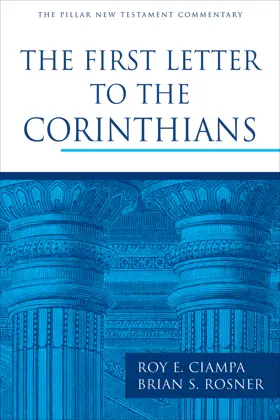

The First Letter to the Corinthians
in Pillar New Testament Commentary
Pages
990
Publisher
Eerdmans
Published
2010
ISBN-13
9780802837325
This thorough commentary presents a coherent reading of 1 Corinthians, taking full account of its Old Testament and Jewish roots and demonstrating Paul's primary concern for the unity and purity of the church and the glory of God. Roy Ciampa and Brian Rosner's well-informed, careful exegesis touches on an astonishingly wide swath of important yet sensitive issues, reinforcing the letter's ongoing theological and pastoral significance.
Collections
This book appears in the following featured collections.
- Recommended New Testament Commentaries for Evangelical Pastors by Thomas R. Schreiner
Reviews
Good and centered in the context
Far more readable than the average commentary.
These two scholars make a great academic team. Ciampa (one of my seminary professors) has expertise in the use of the Old Testament in Paul and also biblical translation theory and practice. Rosner wrote his doctoral dissertation on 1 Corinthians and has written extensively on Paul’s ethics.
[Full Review]
Perhaps the best overall, up-to-date commentary on 1 Corinthians.
[Full Review]
This commentary, written by Roy E. Ciampa and Brian S. Rosner, belongs to the Pillar New Testament Commentary series, which addresses “serious pastors and teachers of the Bible” (xiv). The features of the series mark this volume as well. The commentary is extensive and detailed (the text itself has 867 pages), obviously the result of an enormous amount of work. The exegesis focuses to a lesser degree on academic discussions and more on theological and ethical issues. The commentary uses the TNIV. The few philological aspects of the exegesis are confined to footnotes. The volume has some practical orientation and discusses a number of themes of actuality with respect to Christian life in the modern world (see 1 and the body of the commentary). This explains why scholars of 1 Corinthians will not find within responses to all their questions on exegetical discussions. The lengthy introduction addresses a number of general issues, some of which are usually included in all commentaries (the city of Corinth and the Corinthian church, the structure of 1 Corinthians, and the reading strategy proposed by the commentary), while others would pertain rather to introductions to the New Testament (a quite long chapter on “The Identity and Aims of the Apostle Paul,” with biographical data gleaned from the Pauline Epistles and Acts and a discussion of Pauline theology).
[Full Review]



